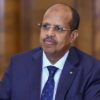
In her response to Ruto’s application seeking excusal from continuous attendance, Bensouda argued that receiving dignitaries and opening roads are not extraordinary duties/FILE
In her response to Ruto’s application seeking excusal from continuous attendance, Bensouda argued that receiving dignitaries and opening roads are not extraordinary duties.
“Not every activity undertaken by the Deputy President of Kenya will be of such a nature; dealing with the aftermath of the Westgate terrorist attack in Nairobi is one such example.
Opening new roads or welcoming a foreign dignitary would not be,” she asserted.
According to her, not all duties that Ruto undertakes as the deputy head of the country qualify as ‘extraordinary duties’.
She said Ruto should demonstrate that the basis under which he is seeking excusal must satisfy the extraordinary nature rule as stated in the Rome Statute.
“Further, by suggesting that a deputy head of state’s functions always satisfy this criterion, the request ignores the word “extraordinary” in the rule. A proper interpretation is that an accused must not only be required to perform “public duties at the highest national level”, but also that those duties must be “extraordinary”, i.e. over and above the normal, day-to-day duties of a deputy head of state,” she explained.
She also suggested that Ruto can assign some duties to other competent leaders in the Government of Kenya so that he can be present for his trial explaining that excusals should be minimal.
“In this case, obvious alternative measures that do exist, include the delegation of routine duties to other competent officials, the accused’s presence via video link, or a court schedule which allows periodic time off to attend to extraordinary public duties. By failing to raise such alternatives – much less explain why they are inadequate – the Defence has failed to meet its burden,” she said.
She argued that if the Trial Chamber grants Ruto the request it will be on the basis of being the deputy head of state but not based on ‘extraordinary’ basis.
The prosecutor further argued that granting the request will contradict the principles of equal treatment of all accused persons.
Bensouda said the law should be applied equally for all accused persons and in consistent with interest for justice for all parties and Kenya.
“The request’s cursory treatment of the “interests of justice” criterion is unpersuasive. It outlines a test, and then fails to meet it, concluding without demonstrating that Mr Ruto’s situation meets the proposed threshold,” Bensouda indicated.
She said the Trial Chamber will give Ruto blanket excusal if it grants the proposal which according to her will also not scrutinize the plea on case-by-case basis as required.
Furthermore, she felt that if granted, the excusal will not pay any attention to critical sessions that Ruto must be physically present.
Ruto made an application informed by the 12th session of Assembly of State Parties amendment that allowed persons holding senior government positions to be represented by their counsels.
The Trial Chamber however asked Ruto to continue attending his trial until it makes a final decision on the request.
His trial was supposed to resume January 13 but was postponed to January 16.














































